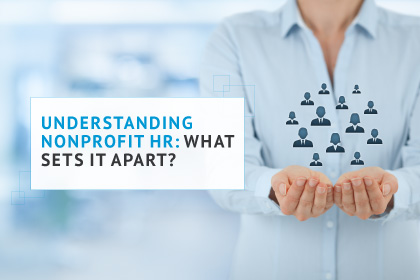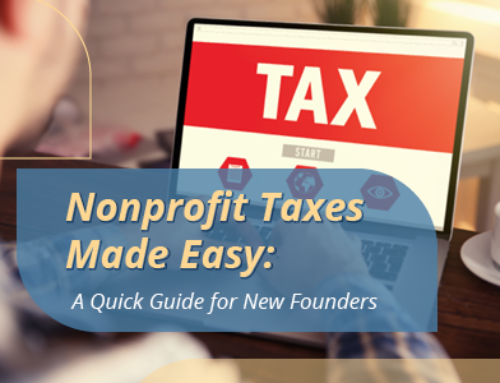
Think back on your nonprofit’s growth journey. Perhaps your nonprofit started with you wearing dozens of hats, from fundraiser to marketer to program officer. Now, you’ve scaled up and have 10, 30, or maybe even 50 employees helping you move your mission forward.
If you’ve experienced this type of rapid growth, you’ve probably realized that your nonprofit could benefit from a robust human resources (HR) framework. To help you start building that framework, or even assembling your first HR department, we’ve created this guide to walk through the basics of nonprofit HR. Let’s begin!
Nonprofit HR vs. For-Profit HR
First, let’s address a common question: Do nonprofits even need HR?
The answer is yes!
It’s a common misconception that HR is just for the for-profit world, but that’s not the case. Just like a business, your organization requires talented employees to gather support for your mission and stay in operation. And you need the right practices and policies in place to ensure those employees are prepared to do their jobs well and have a positive employment experience at your organization.
That being said, there are some differences between for-profit and nonprofit HR.
For-profit organizations tend to have sufficient resources to manage HR, flexibility in how they schedule projects, and the resources and bandwidth necessary for effective employee recruitment and engagement strategies.
But it’s a different story for nonprofits. Here are some of the key aspects of nonprofit HR, according to Astron Solutions:
- Limited resources: Most of the time, nonprofits work on tight budgets and don’t have a lot of resources to devote to HR tasks when they need to focus on their productivity in other areas just to keep the doors open. This can open your organization up to compliance issues and affect the employment experience.
- Volunteer management aspect: Nonprofits frequently rely on volunteers to bolster their projects or programs. This means that along with managing paid employees, nonprofit HR departments also must figure out how volunteers fit into the daily workflow of the organization.
- Project-reliant staffing: Many nonprofits depend on grants and other project- or program-specific funding. Because of this, organizations tend to be more restricted in how they can allocate employees across projects.
- Recruitment obstacles: Because of their small budgets, nonprofits face more challenges when it comes to recruiting top talent. This means that they can’t rely just on salary offerings to find great team members. Nonprofit HR teams have to get creative and figure out how to promote other benefits to create appealing offers for prospective employees.
You may have noticed that as more and more businesses adopt corporate social responsibility (CSR) programs, the lines between nonprofit and for-profit HR departments are blurring a little. Plenty of businesses are prioritizing leaving a positive social and environmental impact alongside pursuing profits. They’re taking notes from the nonprofit HR playbook to determine how they can foster a purpose-driven environment for employees.
This means nonprofit HR departments play essential roles within their own organizations and act as role models for businesses, too!
Nonprofit HR Essential Duties
You now understand how nonprofit HR departments differ from corporate HR departments, but what do nonprofit HR professionals actually do? What can your HR department handle to help take the pressure off your other staff members?
Here are the essential responsibilities of nonprofit HR professionals:
- Compensation strategy. Nonprofit HR departments must balance lean budgets with paying employees a fair and appealing wage. Experts in the field recommend taking a total rewards approach, which emphasizes offering a holistic set of benefits that include direct compensation as well as indirect compensation (such as healthcare, paid time off, retirement plans, and more). Your HR department can help create and maintain this type of strategy.
- Regulatory compliance. Just like any other organization with employees, your nonprofit’s HR department must comply with labor laws. These include the Fair Labor Standards Act, OSHA requirements, social security policies, and all state and local regulations. Plus, your HR department will handle any harassment or misconduct issues.
- Recruitment and retention. Your nonprofit’s HR department will help manage all aspects of the employee lifecycle, from writing job descriptions to hiring to onboarding and beyond. When you lay the foundation for a great employee experience with a robust recruitment process and back it up with effective employee engagement strategies, you’ll boost employee retention and satisfaction.
- Fostering culture. Culture is a broad term that encompasses aspects like how your organization handles internal communications and recognizes employees for their hard work. It includes leading activities meant to build a positive workplace environment, like hosting fun events for your team to get to know each other or promoting work-life balance to help reduce burnout.
- Payroll and taxes. This is one of the most essential tasks your HR department will take on because everyone needs to get paid! HR professionals can handle payroll tasks, as well as insurance coverage and benefits management.
- Volunteer management. Larger organizations may have a full-time volunteer coordinator or manager on staff whose entire role is facilitating the volunteer program. But for smaller or growing nonprofits, this task might land in the lap of your HR team. HR professionals can spearhead strategic volunteer recruitment and retention efforts to maintain this unpaid support system.
Like most members of your nonprofit’s team, your HR professionals will wear many hats depending on your organization’s specific needs. But hiring an HR professional to join your nonprofit ensures that you have at least one person in charge of managing these vital tasks so they don’t fall through the cracks.
Finding the Right HR Approach for Your Organization
If you’re interested in expanding your team to include an HR manager or department, your nonprofit has a few options for different approaches it can take. There’s no one right path that works for everyone. Instead, it’s important to assess the choices available to you to find the right solution for your organization.
Here are your options for adding an HR framework to your operations:
- Create an in-house HR department. If your organization has the resources and time to devote to hiring and onboarding, you can hire a dedicated HR professional to join your team. You can then grow the HR department over time as your needs expand.
- Hire an HR consultant. Hiring an external consultant can be a great way to get your organization started by setting up HR procedures and addressing specific issues. HR consultants can help pilot your nonprofit through a transitional period, implement employee recruitment and retention strategies, and create a compensation strategy. According to Astron Solutions, an important step in finding the right consultant for you is to conduct careful research using online consulting directories and getting recommendations from trusted colleagues.
- Outsource your HR duties. Organizations are increasingly deciding to outsource some or all of their HR responsibilities to external parties. This can help you fill gaps in your HR offerings and bring in objective, external opinions to enhance your HR strategies.
Assess your organization’s budgets and priorities to determine what type of HR investment to make. Run a cost-benefit analysis to determine which choice is the most cost-effective and helpful for your nonprofit.
The Bottom Line
There’s so much going on at your nonprofit every day, and as your organization continues to grow, so will your team and its needs. Get ahead of any potential issues by thinking through your HR priorities now, and consider taking the first steps toward establishing your HR function!
About the Author
 Jennifer C. Loftus is a Founding Partner of and National Director for Astron Solutions, a compensation consulting firm. Jennifer has 23 years of experience garnered at organizations including the Hay Group, Parsons Brinckerhoff, Eagle Electric Manufacturing Company, and Harcourt General.
Jennifer C. Loftus is a Founding Partner of and National Director for Astron Solutions, a compensation consulting firm. Jennifer has 23 years of experience garnered at organizations including the Hay Group, Parsons Brinckerhoff, Eagle Electric Manufacturing Company, and Harcourt General.
Jennifer has held volunteer leadership roles with SHRM, New York City SHRM, and WorldatWork. She serves as a subject matter expert to the SHRM Learning System and as a SHRM instructor. Jennifer is a sought-after speaker for local & national conferences and media outlets.
Jennifer has an MBA in Human Resource Management with highest honors from Pace University and a BS in Accounting summa cum laude from Rutgers University.
Jennifer holds Adjunct Professor roles with Pace University, Long Island University, and LIM College.
Jennifer received the 2014 Gotham Comedy Foundation’s Lifetime Ambassador of Laughter Award.






Leave A Comment